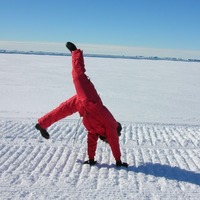
Simone Nunes Brandão
Summary
Simone Nunes Brandão researches on Paleontology and Zoology with a focus on Deep-Sea Ostracoda (Crustacea), and develops projects in Deep-Sea Ecology, Micropaleontology, Paleo/Oceanography, Paleo/Biogeography, Biodiversity, Taxonomy. She is an Adjunct Professor at UFRPE and was a Visiting Professor at UESC (2022-2020) and UFERSA (2018-2019). She worked in the Postgraduate Programs in Zoology (UESC), Ecology and Conservation (UFERSA), Systematics and Evolution (UFRN,) Geodynamics and Geophysics (UFRN). She teaches undergraduate and graduate courses in several areas of Deep Sea, Paleontology, Zoology, Oceanography, Scientific Writing, Climate Change, Geology, Micropaleontology...She holds a Bachelor's Degree (2000) and a Master's Degree (2002, PPGZoo) in Biological Sciences from UFRJ, and a PhD in Natural Sciences from Universitaet Hamburg, Germany (2009). In 2010, she was chosen as a member of the renowned German network of excellence in academic research of the Alexander von Humboldt Foundation, being a fellow of this network from 2010 to 2012. Between 2010 and 2013, she was a postdoctoral fellow and guest researcher at the following institutions: Germany (1) Senckenberg Research Institute (2010-2012); (2) Universitaet Hamburg (2010-2012, 2013); and Belgium (3) Ghent University (2012-2013). In 2013, she was a postdoctoral fellow with a Young Talent scholarship (Level A, 2013-2016) from the Science Without Borders Program, linked to the PPG Geodynamics and Geophysics-UFRN, and then (2016-2018) to the PPG Systematics and Evolution (UFRN).Currently, she collaborates with researchers from Hanyang University (South Korea), International Ocean Discovery Program (USA), Senckenberg Research Institute-German Centre for Marine Biodiversity Research, Senckenberg Museum Frankfurt (Germany), Flanders Marine Institute (Belgium)... Over the past 20 years, she has collaborated with researchers in several other countries, such as Brazil, Belgium, China, South Korea, USA, England, Japan, Norway, etc.2016-2019: negotiated 6 international cooperation agreements with German universities.She participates in international networks for 15 years, being (1) creator, editor-in-chief and curator of the World Ostracoda Database, as well as (2) member of the Steering Committee of the World Register of Marine Species; (3) editor of (3.1) World Register of Marine Species, and of (3.2) Register of Antarctic Species; (4) Advisor to the Humboldt Club of Brazil; Communication Officer of the International Research Group on Ostracoda.She has obtained dozens of funding for scientific projects and trips from international, Brazilian and German institutions. She has participated in training courses in cutting-edge technologies at internationally renowned institutions, such as electron microscopy and curation of zoological collections (The Natural History Museum, England), synchrotron (European Synchrotron Radiation Facility, France), statistics (Universitá di Pisa, Italy), morphometry (Karl-Franzens-Universitaet, Austria), molecular biology (Institut Royal des Sciences Naturelles de Belgique), genomics (Texas A M University, USA), and biodiversity databases (Smithsonian Institution, USA).She has described 127 new taxa (1 family, 9 genera, 2 subgenera, and 115 species).She was a guest speaker at two international events, organized two international workshops and one Brazilian meeting, and participated in over 50 scientific events.She is a reviewer for +40 international scientific journals (e.g. Anthropocene, Frontiers in Marine Science, Geology, Gondwana Research, J. of Micropalaeontology, J. of Systematic Palaeontology, and Palaeontology), and 4 Brazilian ones.She is the author of more than +1,000 pages of scientific articles in international journals, including Nature; Current Biology; Micropalaeontology, Papers in Palaeontology; Zoological J. of the Linnean Society; Paleo3; Deep-Sea Research
Biodiversity Environmental Sciences Marine Biology Paleontology Taxonomy Zoology
Editorial Board Member
